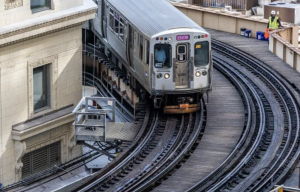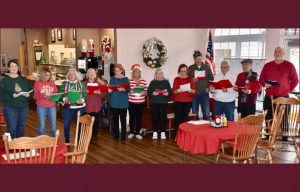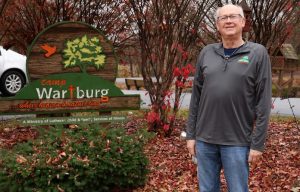Cornerstone Laine gets shot down
Last week, a saga of long public meetings regarding a proposed women-only recovery residence culminated with the Waterloo Zoning Board of Appeals voting against granting the business a special use permit by a narrow margin.
The decision to not grant owners Leisa and Adrian Martinez the permit for Cornerstone Laine was made one night after the Waterloo Planning Commission met the previous evening.
At last Tuesday’s meeting, the planning commission drafted a long list of conditions to recommend the zoning board include in a special use permit.
Even though the zoning board read through these recommendations line by line and addressed each, none of them are now applicable to Cornerstone Laine.
Had the permit been granted for the residence to open in the former Rosedale House senior independent living site at 228 Mueller Lane, the zoning board would have amended the conditions so they did not include those that reiterated already-existing city codes.
The board also would have required “natural barrier evergreen landscaping” in addition to the property’s privacy fence in order to further obscure the facility.
Board member Lauren Poettker later clarified the zoning board also would have required the special use permit terminate six months after Cornerstone Laine ceased operation or six months after it was put for sale.
A large part of the planning commission’s decision was potential legal ramifications that could result if the city did not allow Cornerstone Laine to operate. Waterloo Planning Commission Chairman Nathan Rau said that from his understanding, this could open the city up to lawsuits under the Fair Housing Act.
Amanda Chase, an attorney with Strellis & Field Chartered in Waterloo, told the board the Americans With Disabilities Act and equal protection clause of the Constitution also prove relevant in this case.
“Under the Fair Housing Act, people who are in recovery – so not people who are currently using controlled substances, but people who are in recovery – are qualified under the Fair Housing Act as a person who is entitled to a reasonable accommodation, and when municipalities don’t honor that duty under the law to provide a reasonable accommodation in their zoning practices, they will subject the municipality to discrimination litigation,” Chase explained.
Chase used a recent court case to solidify this argument.
“For example, the City of Hinsdale was recently sued by the Department of Justice, and they were in a situation that was very similar to ours,” Chase addressed the zoning board. “The prosecuting attorney in that case specifically said that when you adopt the ‘not in my backyard’ discrimination mentality and you don’t provide a reasonable accommodation for those who are entitled under the Fair Housing Act, then you discriminate.”
Waterloo Ward I Alderman Steve Notheisen told the Republic-Times he believes the action taken by the zoning board is discriminatory and could open the city up to a lawsuit.
Notheisen even called on Waterloo Mayor Tom Smith to take action.
“I’ve been an alderman for over 18 years. Every four years, I take an oath of office to protect the United States Constitution, (and) so have all of the other aldermen and the mayor,” Notheisen said in a statement. “To allow the zoning board to deny the recovery center a special use permit is a denial of the civil rights of those recovering addicts and is a violation of our oath of office. With the resignation of local mayors for violating their oath of office, I can not imagine Mayor Smith not having the courage to take a stand against the zoning board and finding a way to override their decision before the U.S. Justice Department intervenes and forces us to do so.”
Smith told the Republic-Times he did not wish to issue a comment on this matter.
Many neighbors who opposed Cornerstone Laine being granted a special use permit told the zoning board they felt their concerns were being overshadowed by the potential for litigation.
“I was at the planning meeting last night … and the first thing out of (the Waterloo Planning Commission’s) mouth was they were talking about how they were afraid of a lawsuit,” John Rapp, a Waterloo resident, told the zoning board last Wednesday. “That was their main concern, and all I have (to say) is please don’t keep jamming this down our throats. We have rights also as citizens of Waterloo and as a subdivision.”
Rau explained the planning commission’s rationale for stressing the importance of the potential blow back that could come with not granting the permit after hearing Rapp and other neighbors’ concerns about not being heard.
“I heard the concerns about playing the litigation card … If people want something that according to attorneys for the city (and/or) other independent attorneys that I’ve talked to say could very likely – not for sure – be seen as illegal and discriminatory in the eyes of the Department of Justice, that’s a factor. It’s not the only one, but it was very important … we have to consider that as we try to balance the concerns of the neighborhood with the legalities that we’re facing and the overall health of the City of Waterloo.”
The overarching theme of those opposed to the Martinezes’ petition were related to it being housed on Mueller Lane.
“I hope that when you take consideration on this special use permit that you will think of it as I do. Would you want your family, your house and everything else next to a place like this?” Waterloo resident Matt Busby asked zoning board members. “I think it’s a great idea, but I do think it’s a very bad location for it.”
Another common concern was security. While the drafted conditions clearly stated the residence needed to have a security system with alarms on all windows and doors, security cameras in indoor common areas and outdoors and “all visitors shall be pre-screened and approved my management prior to entry,” Donna Ward, a nearby resident, said there was no way to guarantee this would be enough.
“I don’t know how you can tell us you can vet the people who are going to be coming to visit them.” Ward said at last Wednesday’s meeting. “This is a community where we have felt safe … How are we going to still feel the same safeness that we have felt there knowing full well that some of these people are going to have husbands, boyfriends, friends who are going to be … waiting to meet them to bring them drugs, or something (else)? Are we going to enhance the security of our neighborhood? Are we going to have somebody coming through at a very regular interval? Are we going to have somebody who is watching what’s going on? Because no matter what, they cannot promise us that these people who are visiting them are not there to do harm.”
In documents provided to the planning commission and zoning boards, the Martinezes stated they had talked to Waterloo Police Chief Jeff Prosise about this.
“We have had discussions with Chief Prosise regarding police patrol in the area,” the document states. “He could not indicate the number of patrols per day, but assured me that ‘if’ the need arose, they would increase patrols. He gave the example of a bar with fights and unruly customers, stating the police are usually very close to the bar in the later hours of the evening to be a deterrent. Chief Prosise as well as the other city officers and sheriff deputies we have talked to have not expressed any concerns regarding our facility and an increase in crime.”
Concerns about what qualifications Cornerstone Laine staff members needed were also raised. Beth Deno of the St. Louis-based nonprofit ACPD, which was partnering with the Martinezes to help run Cornerstone Laine, provided the zoning board with some insight.
“When you are applying for a position in a recovery facility, there are qualifications that you have to go through and certifications … it’s very, very unlikely that they are underqualified for the position that they are going into,” Deno explained. “They do have to go and have Narcan training, they also have to be certified with a fire department for CPR and there are other certifications. Most of the people who are going to be in our full staff … have been in positions where they’ve been in other recovery centers.”
How the facility would impact the community as a whole was a topic of both meetings.
While Chase and others who supported the Martinezes called Cornerstone Laine a “blessing,” others feared it would, as nearby business owner Stephanie Hunter said at last Tuesday’s meeting, “cause our community to decline.”
Zoning board member Ron Hagenow said the Martinezes addressed such concerns in documents they provided the board, yet he said he was not sure the studies they provided were applicable to a smaller city like Waterloo.
Hagenow mentioned studies the Martinezes provided focused on crime rates and property values, but Leisa said the studies she outlined for the board focused on crime rates, not necessarily property values, as she said there is a shortage of research on the latter topic.
“I went back and found the response that (the Martinezes) provided to the planning commission, and in there, their studies were based on studies of urban crime in Baltimore and Seattle. Does Waterloo have an urban crime problem, and are we Baltimore or Seattle?”
In response, Leisa told the Republic-Times, “I provided five scholarly articles that I believe cover the nation as a whole. One of them that I remember talked about nationwide trends.”
The Martinezes were asked to field many of these questions both nights, and while Leisa said she was OK with addressing the concerns of those who live near the proposed site, she knows she would have a different experience if her business were of a different nature.
“If I were Leisa’s Double L Bar, would we have conversations on how my bartenders are going to be trained? How my manager is going to be trained? Who (I) am going to hire? Who (I) am going to serve?” Leisa said to the zoning board last Wednesday night. “No, the assumption would be made that we would operate as a legitimate, respectful business that’s going to follow the rules. So we can go down the rabbit hole and into the minutia over and over, and I don’t mind, but respectfully I feel that we provided everything.”
While Leisa said she and Adrian are disappointed with the board’s decision, she does not believe their efforts were a total loss.
In June, the Waterloo City Council decided recovery residences are now allowed in B-2 zoned general business districts, provided they receive a special use permit.
“I feel like getting the wording of the recovery residence into the zoning text was a huge step, and I don’t know what God’s plan for us is moving forward, but I’m thankful that we were at least able to provide that for the city and the people who have stood behind us,” Leisa said. “We would like nothing more than to be able to find an alternative location close by, but … it’s too soon to know.”
Madelyn McGinnis, a Columbia resident who shared she is two years into recovery, said she has found it very hard to find feasible recovery residences in the county, and this is why she was so hopeful Cornerstone Laine would come to Waterloo.
“I like to compare what’s going on in Monroe County to what they call a ‘food desert,’ where there’s no supermarkets and people can’t get fresh produce. It’s like a recovery desert in Monroe County,” McGinnis told the zoning board, later adding, “When it was time for me to try to get the help that I needed, (I heard) ‘Oh, we don’t take your insurance,’ or ‘Oh, that’s a five-month wait list.’ It’s always something, and we have a real chance to make a difference in our community and save lives, and I’d like people to consider that.”
Cornerstone Laine will not be operating on Mueller Lane, and while Leisa said she does not know the couple’s next move, she is sure of one thing:
“Our mission to help women in their journey of recovery has not changed,” Leisa said in a statement. “We will move forward as God directs us.”
For those looking for faith-based recovery assistance, contact the Denos via the ACPD Facebook page, or via their website austinsarmy97.org. The studies referenced earlier in the article are included in the July Zoning Board of Appeals packet, along with other information.






